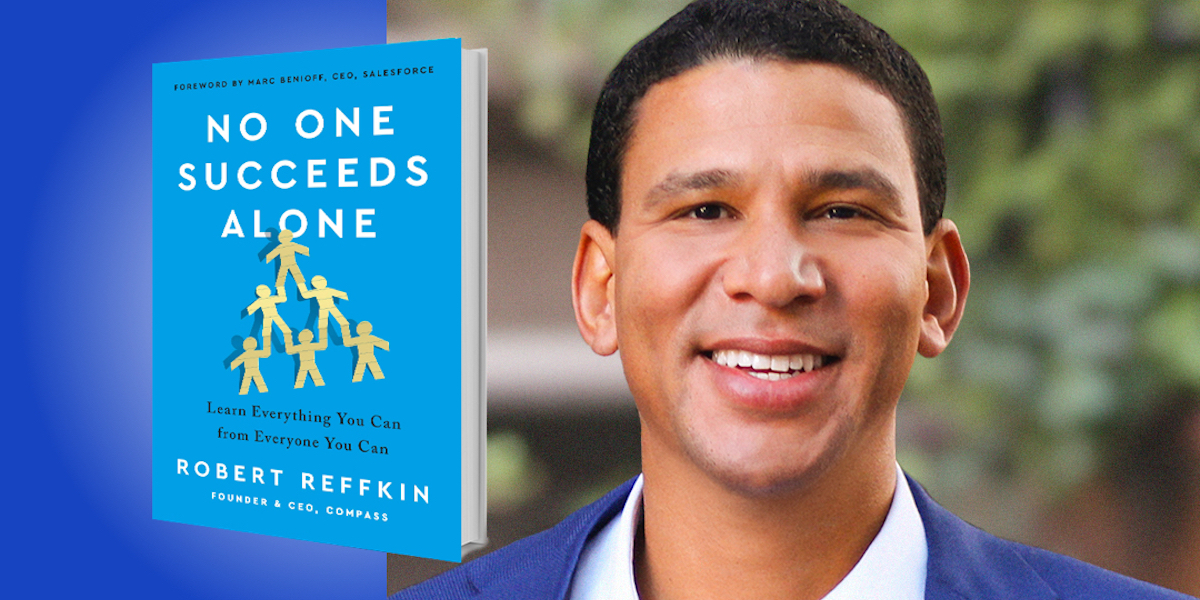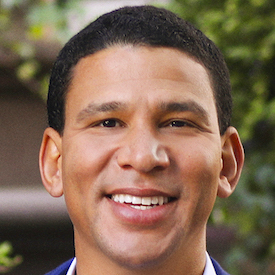Robert Reffkin is the founder and CEO of Compass, the real estate technology company that’s now the largest independent brokerage in America. His mission in life is to help everyone find their place in the world, and realize their dreams.
Below, Robert shares 5 key insights from his new book, No One Succeeds Alone: Learn Everything You Can from Everyone You Can (available now from Amazon). Listen to the audio version—read by Robert himself—in the Next Big Idea App.
1. No one succeeds alone.
In our society, it’s easy to forget how interconnected we all are. It’s easy to think it’s all about you—how hard you work and how smart you are—but we’re all running a single leg in a relay race that began long ago, and will continue long after we’re gone.
I’ve had more mentors than anyone else I know. Perhaps because I didn’t have a father, I sought out more meaningful relationships with mentors than others did, and stayed close to the ones who really seemed to care about me.
My mom was my first, most significant mentor, but I wouldn’t have made it through elementary school without the encouragement of people like my fifth-grade teacher, who looked past my skin color and saw my potential. I wouldn’t have gotten into one of the best private high schools in San Francisco without the support of a half-dozen nonprofits that taught me about college, entrepreneurship, and how to obsess about every possible opportunity.
“Every entrepreneur has a lot to learn from the resilience, resourcefulness, creativity, care, passion, and positivity of mothers.”
I can point to 20 different moments in my life where my future hung in the balance—even though I didn’t always realize it at the time. If those doors hadn’t been opened, if those connections hadn’t been made, if those kindnesses hadn’t been extended, I would not be where I am today. And I suspect the same is true for all of us.
2. Every mother is an entrepreneur.
Being a mother and being an entrepreneur are the same in so many ways. In both cases, you’ve got this big dream for the future. You’re always thinking about tomorrow. You know that to get from here to there, there are no shortcuts—you’re just going to have to wake up every morning and put in the work. A lot of the things you have to do are repetitive and thankless, way below your pay grade, and nearly impossible to hand off to anyone else. You’re frequently unsure whether you’re doing it right or not, but you keep going because you know that others are counting on you with their literal or figurative lives.
Oftentimes, it all feels impossible, but giving up is never an option. And then, there are these moments of absolute joy, and this sense of satisfaction that what you’re doing truly matters. Every mother is an entrepreneur, and every entrepreneur has a lot to learn from the resilience, resourcefulness, creativity, care, passion, and positivity of mothers.
3. Feedback is a gift.
Linda Mornell, who ran a nonprofit that I participated in as a teenager, gave me a lot of advice. The biggest thing Linda taught me was that if I waited for the perfect person who would give me constructive criticism in a way that’s easy for me to hear, I’d be waiting a long time—and I’d miss out on a lot of learning. If I could learn to brush off the tone and the delivery of hard-to-hear feedback and look for the valuable advice underneath it, I would learn more and get better much more quickly.
“If you can open yourself up to receive it, then know that getting blunt feedback helps you get better faster.”
The reality is that honest feedback is a gift, but most people hate it, so people usually avoid giving it—especially to people who are disadvantaged in life. You have to actually say to people, “I want you to give me the kind of feedback other people aren’t going to give me. I know it’s hard to give, but don’t worry, I can take it.”
If you can open yourself up to receive it, then know that getting blunt feedback helps you get better faster. If you actually take that feedback, the people who gave it become invested in your success, and this simple fact is at the core of relationships I’ve built with dozens of mentors in my life.
4. Surround yourself with people who give you energy.
There are two kinds of people in this world: people who give you energy and people who take it away. When I’ve collaborated with colleagues who don’t inspire me or challenge me or give me a reason to be my best, work has felt like an endless slog. But when I’ve surrounded myself with people who do give me energy, it feels like there’s always enough time in the day.
In 2009, I decided to start a nonprofit to help students who were first in their families to go to college and were living below the poverty line, which at that time in New York City was around a $29,000 annual household income.
To succeed, I knew I needed to attract mentors to help the students, and donors to support the nonprofit. Every potential mentor was already working long hours at their day jobs, and every potential donor had many other important causes to support—but these students and their stories gave everyone energy: mentors, donors, board members, me. Their life stories were inspiring. Their passion was infectious, and the progress they made while working with us was tangible, visible, and transformational.
“The secret is to know that you don’t know the secret—your clients and customers do.”
I felt the energy in every board meeting, which often went until 1 or 2 a.m., asking the same questions over and over: What can we do to be better? How else can we help these students achieve their dreams? That is the power of energy.
5. Love your customers more than your ideas.
I made over $100,000 in high school with my DJ business, Rude Boy Productions. I wasn’t the most skilled DJ, I didn’t know or own more music than other DJs, and I didn’t have the loudest speakers or the best turntables. My competitive advantage was that, unlike most DJs who played the music that they liked, I would play whatever the guests wanted. I’d read the room and choose tracks that got people moving. Whenever I felt the energy start to fade, I’d switch it up quickly and get things jumping again. To make sure that the person who hired me was happy at the end of the night, I pledged to play up to 20 songs they requested. I even promised them their money back if I didn’t. I called it the “Rude Boy Productions guarantee.”
I worked hard—but that’s not why I succeeded and became the most utilized DJ in the Bay Area private school scene. I succeeded by listening to my customers, caring about them, and prioritizing their happiness over my own musical taste—even though I was a moderately cool high schooler, and they were newly bar-mitzvahed middle schoolers.
The secret is to know that you don’t know the secret—your clients and customers do.
To listen to the audio version read by Robert Reffkin, download the Next Big Idea App today:
































